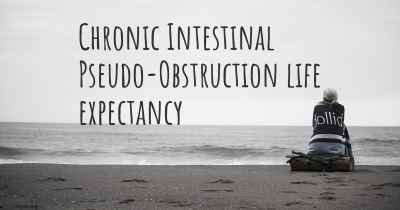Which advice would you give to someone who has just been diagnosed with Chronic Intestinal Pseudo-Obstruction?
See some advice from people with experience in Chronic Intestinal Pseudo-Obstruction to people who have just been diagnosed with Chronic Intestinal Pseudo-Obstruction

Advice for Coping with Chronic Intestinal Pseudo-Obstruction
Receiving a diagnosis of Chronic Intestinal Pseudo-Obstruction (CIPO) can be overwhelming and challenging to navigate. CIPO is a rare condition that affects the normal movement of the intestines, leading to symptoms such as severe abdominal pain, bloating, nausea, and constipation. While there is no cure for CIPO, there are several strategies and lifestyle changes that can help manage the symptoms and improve your quality of life. Here is some advice to consider:
1. Educate Yourself
Take the time to learn about CIPO, its causes, symptoms, and available treatment options. Understanding your condition will empower you to make informed decisions about your healthcare and communicate effectively with your medical team.
2. Build a Support Network
Reach out to friends, family, and support groups to create a strong support network. Connecting with others who have CIPO or similar conditions can provide emotional support, practical advice, and a sense of belonging. Online communities and local support groups can be valuable resources.
3. Establish Open Communication with Your Healthcare Team
Develop a trusting relationship with your healthcare providers. Regularly communicate your symptoms, concerns, and treatment preferences. Collaborate with them to create a personalized treatment plan that addresses your specific needs and goals.
4. Follow a Specialized Diet
Consult with a registered dietitian who specializes in gastrointestinal disorders. They can help you develop a customized diet plan that suits your needs. In some cases, a low-fiber or liquid diet may be recommended to ease symptoms and improve digestion.
5. Manage Stress
Stress can exacerbate symptoms of CIPO. Explore stress management techniques such as deep breathing exercises, meditation, yoga, or engaging in hobbies that bring you joy. Prioritizing self-care and finding healthy coping mechanisms can help reduce stress levels.
6. Stay Active
Engage in regular physical activity, as tolerated and advised by your healthcare team. Exercise can help stimulate bowel movements, improve digestion, and enhance overall well-being. Consult with your doctor to determine the appropriate level and type of exercise for your condition.
7. Seek Emotional Support
Living with CIPO can be emotionally challenging. Consider seeking therapy or counseling to help you cope with the emotional impact of your diagnosis. A mental health professional can provide guidance, support, and coping strategies to navigate the emotional ups and downs.
8. Plan Ahead
CIPO symptoms can be unpredictable, so it's important to plan ahead for potential flare-ups or emergencies. Keep a list of emergency contacts, pack a bag with essential items, and communicate your condition to close friends, family, and coworkers. Having a plan in place can provide peace of mind.
9. Stay Informed about Research and Clinical Trials
Stay updated on the latest advancements in CIPO research and clinical trials. New treatments and therapies may become available, and participating in clinical trials can contribute to the development of better management options for CIPO.
Remember, everyone's experience with CIPO is unique, and it may take time to find the right combination of treatments and lifestyle adjustments that work for you. Be patient, advocate for yourself, and don't hesitate to seek additional medical opinions if needed. With proper management and support, it is possible to live a fulfilling life despite the challenges posed by CIPO.








